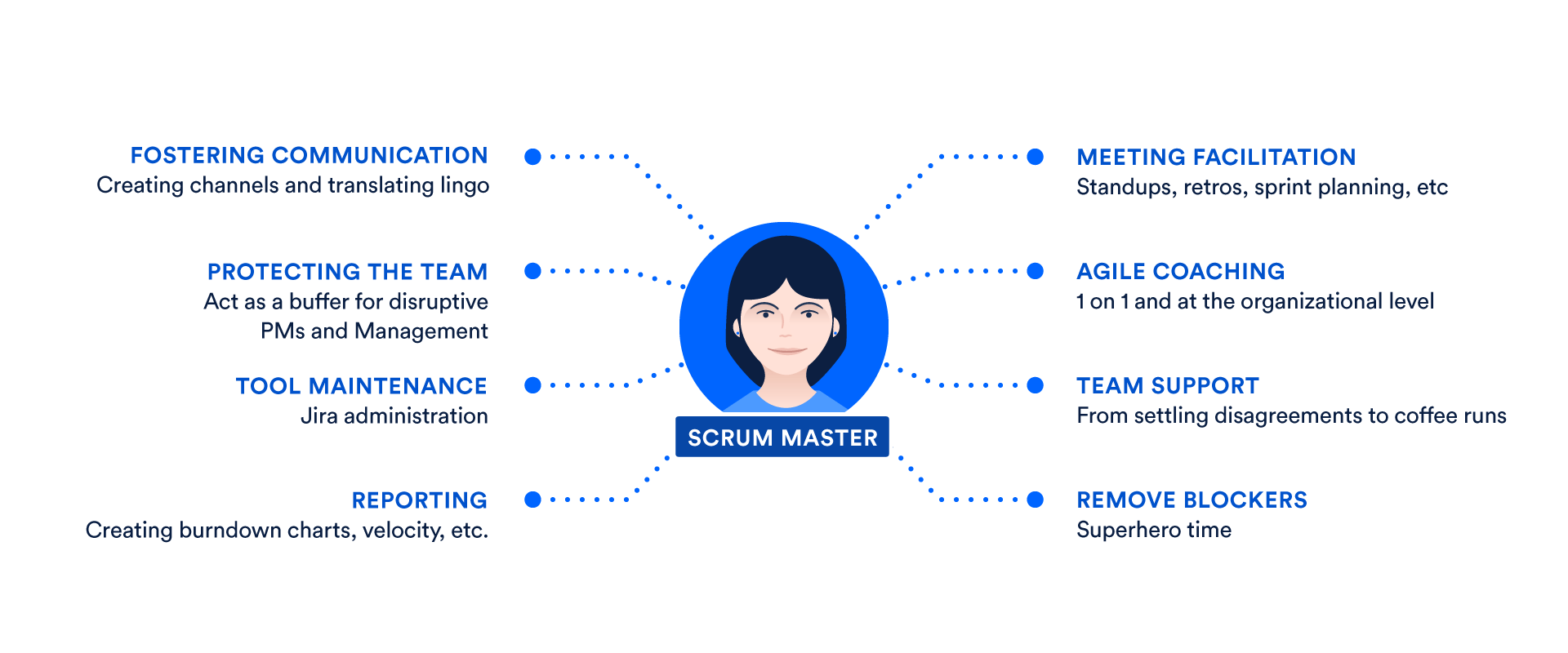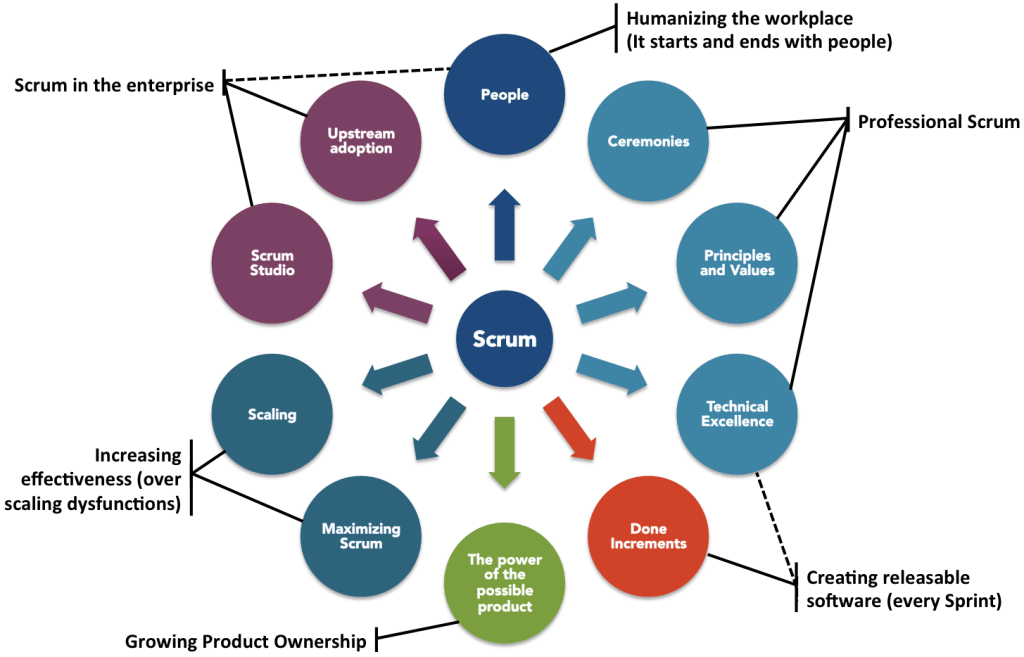
- Introduction to Scrum and the Scrum Master Role
- What is a Scrum Master?
- Key Responsibilities of a Scrum Master
- Skills Required for a Scrum Master
- Scrum Master vs. Other Roles: Differences and Collaborations
- Challenges Faced by Scrum Masters
- Conclusion
Eager to Acquire Your Data Science Certification? View The Data Science Course Offered By ACTE Right Now!
Introduction to Scrum and the Scrum Master Role
In Agile methodology, Scrum is one of the most widely used frameworks to manage and execute projects. Scrum provides a structured yet flexible approach to developing complex products and encourages collaboration, adaptability, and continuous improvement. At the heart of Scrum lies the Scrum Team, which includes three main roles: the Product Owner, the Development Team, and the Scrum Master. Each role contributes to the success of the project and ensures that the team stays aligned with Agile principles, including Data Science Training, which helps enhance the team’s technical capabilities. The Product Owner is responsible for defining the vision of the product, prioritizing the product backlog, and ensuring that the team is working on the most valuable tasks. By engaging with stakeholders and gathering feedback, the Product Owner ensures that the product meets the business needs and expectations. The Development Team, which consists of cross-functional professionals, works on delivering product increments during each Sprint. They are self-organizing and collaborate to design, develop, test, and deliver high-quality product features.
What is Scrum?
The Scrum Master is a servant leader who plays a pivotal role in helping facilitate the Scrum process by supporting the team, the Product Owner, and the entire organization in achieving their goals. The Scrum Master does not manage or control the team but instead acts as a coach, a facilitator, and a problem-solver. They work diligently to ensure that the Scrum framework is followed correctly and help the team improve continuously by identifying and removing any obstacles that may hinder progress. In simple terms, the Scrum Master creates a collaborative environment where the Scrum Team can work effectively and efficiently, ensuring that all processes run smoothly and that the team is empowered to deliver high-quality, valuable products on time. By fostering a culture of trust, communication, and accountability, the Scrum Master also helps to inspire team members to reach their full potential and contribute to the overall success of the project.

Key Responsibilities of a Scrum Master
A Scrum Master has a variety of responsibilities, all aimed at improving the team’s ability to follow Scrum practices and deliver value. Let’s take a closer look at the key responsibilities:
Facilitating Scrum Events
The Scrum Master is responsible for facilitating key Scrum events (also called ceremonies) and ensuring they are productive:
- Sprint Planning: Help the team plan the Sprint by ensuring the right goals are set and the right tasks are selected.
- Daily Scrum (Standups): Ensure that the daily stand-up is held on time, and encourage team members to focus on the purpose of the meeting discussing progress, obstacles, and plans for the day.
- Sprint Review: Facilitate the review session, ensuring that the team demos their work to Stakeholder Management and feedback is captured.
- Sprint Retrospective: Ensure that the team has an opportunity to reflect on their work and processes in order to identify areas for improvement.
Coaching the Scrum Team
The Scrum Master coaches the Scrum Team on best practices and the Scrum process itself. This includes:
- Helping the team understand Scrum theory, values, and principles.
- Coaching team members on collaboration, self-organization, and accountability.
- Encouraging a mindset of continuous improvement and growth.
Removing Impediments
One of the key roles of the Scrum Master is to identify and remove any impediments or obstacles that might slow the team down. These impediments could include technical issues, lack of resources, or organizational roadblocks. By eliminating these hindrances, the Scrum Master helps the team stay focused and efficient.
Protecting the Team from Distractions
The Scrum Master protects the Scrum Team from external disruptions that may affect their ability to focus. This includes managing stakeholder interference, handling distractions, and ensuring the team is shielded from outside pressure to take on additional work outside the Sprint Backlog.
Excited to Obtaining Your Data Science Certificate? View The Data Science Training Offered By ACTE Right Now!
Supporting the Product Owner
The Scrum Master works closely with the Product Owner to ensure that the Product Backlog is well-maintained and clearly defined. They assist with refining the backlog, ensuring that backlog items are clear, actionable, and prioritized properly. The Scrum Master also helps the Product Owner understand how to best interact with the team and gather feedback.
Ensuring Scrum Practices are Followed
The Scrum Master ensures that Scrum practices and principles are adhered to by the team. They do not enforce Scrum; instead, they help guide the team to understand and respect the framework. This includes holding regular Scrum Ceremonies, ensuring that the team follows Agile principles, and fostering an environment of trust and collaboration.
Interested in Pursuing Data Science Master’s Program? Enroll For Data Science Master Course Today!
Skills Required for a Scrum Master
To effectively fulfill their responsibilities, a Scrum Master must possess a unique set of skills that blend leadership, facilitation, and problem-solving. Strong communication skills are crucial, as the Scrum Master must facilitate discussions, ensure everyone is heard, and convey information clearly. These skills are also vital for resolving conflicts and aligning team members with organizational goals. A Scrum Master must also be an excellent problem-solver, capable of identifying issues and thinking critically to resolve them, whether addressing impediments, optimizing Scrum processes, or applying Data science Training to analyze and solve complex problems. As a coach and mentor, the Scrum Master guides the team in self-organization, encourages collaboration, and helps team members develop their skills, requiring patience, empathy, and the ability to foster trust. Conflict resolution is another essential skill, as conflicts are inevitable in any team environment. The Scrum Master must be adept at handling conflicts constructively, whether they are interpersonal issues or disagreements over task approaches, by promoting open communication and collaboration. Lastly, empathy and emotional intelligence are key for understanding team members’ perspectives, concerns, and emotional states, enabling the Scrum Master to foster a positive, productive environment and navigate team dynamics, stress, and interpersonal relationships effectively.
Preparing for a Data Science Job Interview? Check Out Our Blog on Data Science Interview Questions & Answer
Scrum Master vs. Other Roles: Differences and Collaborations
The Scrum Master works closely with the Product Owner and the Development Team, but each of these roles has distinct responsibilities:
- Product Owner: The Product Owner manages the Product Sprint Backlog, prioritizes work based on business needs, and ensures the team delivers the most valuable features. The Scrum Master helps the Product Owner interact with the team and maintain the backlog.
- Development Team: The Development Team is responsible for creating the product increment during each Sprint. The Scrum Master facilitates their work by removing obstacles and ensuring they have the resources and support they need to succeed.
- Resistance to Change: Teams or organizations may resist adopting Scrum or Agile practices, requiring the Scrum Master to engage in change management.
- Balancing Multiple Stakeholders: The Scrum Master may have to balance the demands of various stakeholders while ensuring that the Scrum Team remains focused on the Sprint Goal.
- Team Dynamics: Managing team dynamics, motivating disengaged team members, and resolving conflicts can be difficult tasks for the Scrum Master.

Challenges Faced by Scrum Masters
Despite being an essential part of Agile teams, Scrum Masters face several challenges:
Conclusion
The Scrum Master is a pivotal figure in the success of Scrum teams and Agile projects. Acting as a servant leader, coach, facilitator, and problem-solver, the Scrum Master ensures the Scrum process is followed effectively. They create an environment where the team can focus on delivering high-quality work by removing any impediments that might slow progress. In addition to removing obstacles, the Scrum Master helps guide the team by fostering a mindset of continuous improvement. They encourage open communication, collaboration, and self-organization, empowering team members to take ownership of their work, supported by Data Science Training to enhance their skills. The Scrum Master also plays a crucial role in facilitating Scrum ceremonies, such as daily stand-ups, sprint planning, reviews, and retrospectives, ensuring that these events are productive and serve their intended purpose. Ultimately, the Scrum Master is responsible for ensuring that the team works efficiently within the Scrum framework, allowing the team to consistently deliver value and meet project goals. Whether you’re aspiring to be a Scrum Master or simply wish to understand the role better, it’s clear that this role is essential to the success of any Agile team.


